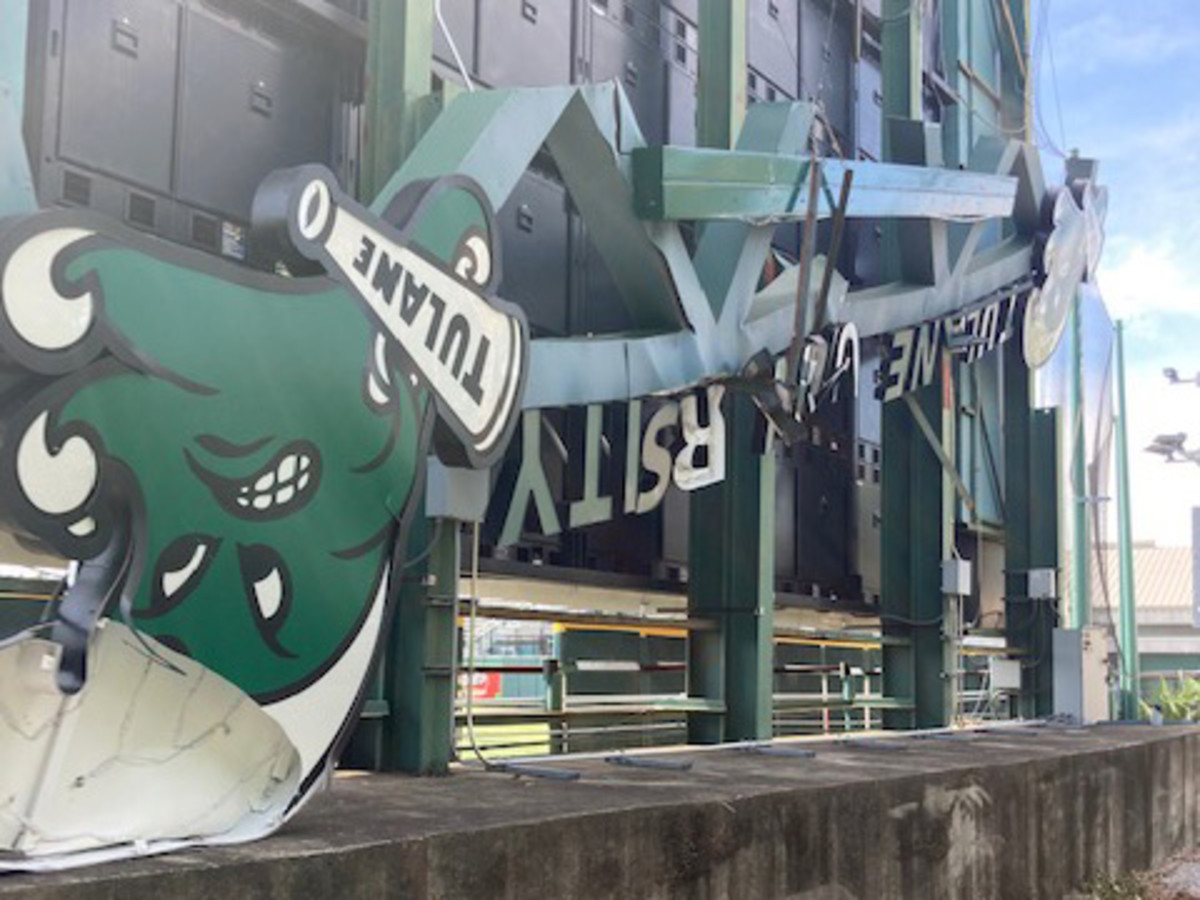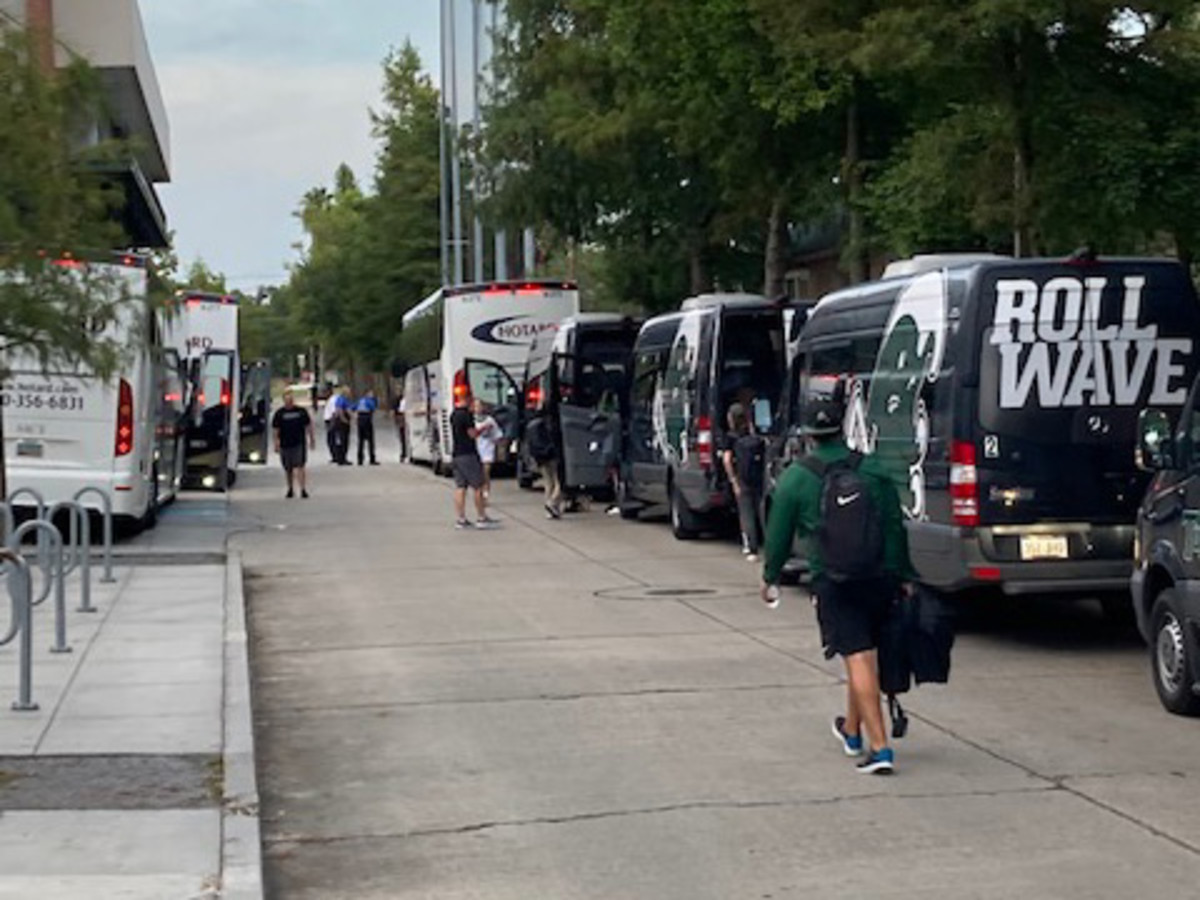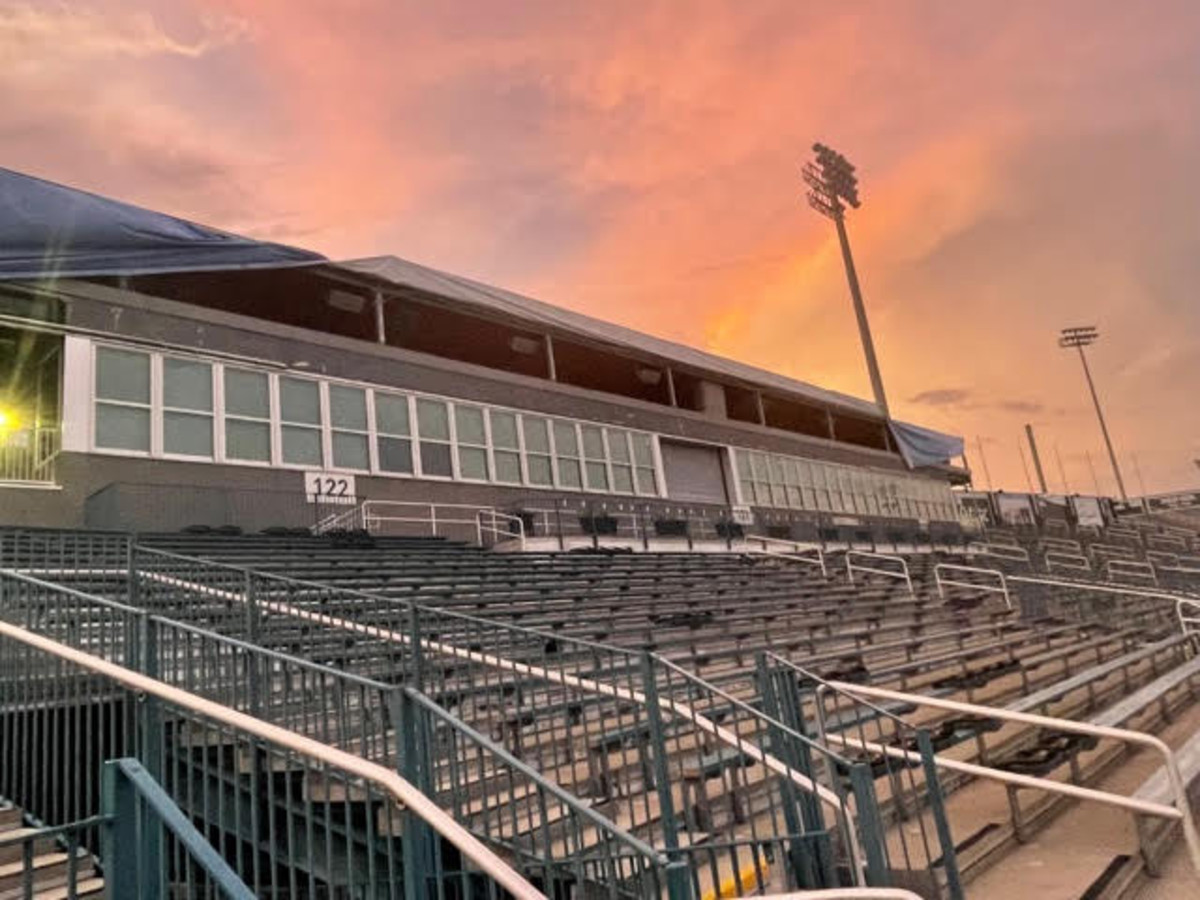A Rescue Mission and an Evacuation Plan: Inside Tulane’s Hectic Preparations for Oklahoma
It is Tuesday at about 9 p.m., and Gabe Delatte is somewhere between Slidell, La., and Hattiesburg, Miss., driving a box truck emblazoned in green up I-59, tired as hell and emotionally spent.
He’s on the back end of a 36-hour rescue mission to deliver both supplies and people from storm-torn New Orleans to Tulane’s new centralized sports hub, Birmingham, Ala.

Delatte, TU’s 30-year-old director of equipment, and a handful of others, arrived in the city 24 hours after Hurricane Ida left it windblown, shell-shocked and completely powerless—a blacked-out minefield of debris. Like the Navy SEALs of college sports, they quietly completed their mission in a few hours. They helped load 60 athletes and staff members, who braved the storm from the city, into two buses and six vans bound for Alabama, and then filled the Green Wave’s equipment truck with necessities—all while working in the dark.
“That was fun,” he says jokingly. “We did what we’d normally do in a week in a day. It’s been rough.”
And now here he is, on the haul back to Birmingham with the most precious of cargo. After all, Tulane’s game against No. 2 Oklahoma on Saturday, relocated from New Orleans to Norman, can’t happen without the products he’s carrying: cleats, extra helmets, face masks and uniforms.
“We’re trying to do what we can for our players, make them feel like it’s a normal week for them,” says Devin Charles-Hubbard, the associate equipment director who’s riding shotgun in the box truck. “A football game might help us feel kind of normal. Sometimes these things can be a relief, a distraction.”
Sixteen years after Hurricane Katrina sent the school’s football team on a turbulent nomadic journey, the Green Wave are back on the road, another major storm having disrupted life just before the season kicks off.
The football team and some others—around 160 people total—evacuated Saturday to Birmingham, a day before the storm roared ashore, and are using practice facilities both at the University of Alabama and UAB. The school expects at least 100 Tulane athletic folks to join them in what’s becoming the Alabama bureau of the Tulane athletic department. Administrators, coaches and athletes are all operating from and sleeping in the downtown Sheraton, less than a block from the headquarters of the Southeastern Conference.

For a while, as the storm rolled through, there was no communication with anyone in southern Louisiana, as massive cell towers crumbled under winds of more than 100 mph. Tense moments led to restrained joy over the news: New Orleans’s levees held back the sea of water that decimated the city 16 years ago.
Still, there are problems. Ida left one player’s roof in tatters and brought a foot of water into an assistant coach’s home. Many players have friends and extended family members who are stranded in a city without electricity, patching roofs, clearing debris and searching for gasoline, all while suffering through sweltering summer heat with no air conditioning. The heat index eclipsed 100 degrees at least twice this week.
There is no end in sight. Entergy, the power supplier to the area, has estimated that the city could go a month without electricity.
“There’s a lot of weight on everyone’s shoulders of a personal nature right now,” athletic director Troy Dannen says.
Tulane officials expect they’ll remain in Birmingham for at least four to six weeks. The football team is already preparing to host its next few home games at Legion Field.
“It’s a road trip of an extended magnitude,” Dannen says. “Hotel rooms are going to be home for a while.”
Dannen and his staff are operating under a 25-page hurricane evacuation plan that the school has had since Katrina. For at least the last 10 years, in fact, TU has held a contract to occupy the entire Birmingham Sheraton if New Orleans is uninhabitable.
“The hotel has been great,” says deputy athletic director Chris Maitre, who’s been at Tulane since 1996 and has led this evacuation operation. “They are extremely pet-friendly.”
He means it. Staying in the hotel with their owners are at least 30 dogs, eight cats, four rats, two guinea pigs, a tarantula spider and one snake.
“I don’t know what we’re going to do with all these dogs when we leave for the game,” says coach Willie Fritz, laughing.
Most people packed for about three days. That includes Fritz, who says he has with him two pairs of shoes—both tennis shoes. Delatte’s expedition back into New Orleans was in part to return with more supplies. But the group also delivered goods to a campus in need, bringing them six generators, gas, diesel and Verizon cell phones, at one point the only carrier with service in the city.
Maitre, Delatte and about eight others left Birmingham around 6 p.m. Monday, cutting across Mississippi and driving through a portion of Ida. It took them about nine hours to make what’s normally a five-hour drive. They made it to Maitre’s New Orleans–area home for a two-hour nap at 3 a.m. and then headed into the city, where they unloaded the goods and then loaded people and supplies for the trip back.
An armada of Tulane vehicles jetted up I-59 all day Tuesday. Tulane track coach Adrian Myers found himself in one of the vans. Myers, a Midwesterner who was in his first month on the job, hunkered down with his family in their Uptown New Orleans home near TU’s campus for his first hurricane experience.
His home lost power about an hour before the worst of the storm rolled in. And then came the scary part.
His attic vent, wobbling in the wind, nearly blew off completely. He quickly climbed into the attic and used bed sheets to tie the vent to wooden support beams.
“If it would have blown off, we’d have water spilling through the ceilings,” he says.

Tulane’s campus was mostly spared. The storm left athletic facilities with no real structural damage, officials say.
The city, however, is covered in debris. It’s somewhat of a ghost town at night, Myers says. After the hurricane passed, he and a friend drove around some. The hum of generators are the only sounds whirring through the streets.
“It was like the first scene of The Walking Dead and they’re driving out of Atlanta and cars are parked on the highway. All these cars are just left parked on the side of the roads,” he says. “Nobody was out. Nobody walking around. It was eerie. It’s pitch black and dead silent.”
The outpouring toward the university has been exceptional, says Dannen. This week, Alabama allowed the Green Wave to practice in its indoor facility while it rained in Birmingham. Texas A&M athletic director Ross Bjork is offering free football tickets to Aggies home games to Tulane students who are relocating to Houston, the university academic arm’s evacuation site.
Oklahoma is giving Tulane the ticket revenue from Saturday’s relocated game and has promised to schedule a return trip to New Orleans at a later date. TU will still travel to OU in 2024 as part of the home-and-home agreement, Dannen says.
Meanwhile, Fritz and staff are attempting to prepare for a game against the second-ranked team in the nation from a hotel located two states over.
“You got a curveball thrown at you,” Fritz says. “You just got to adjust. Things could be a lot worse.”
In the meantime, back in the box truck, Delatte and Charles-Hubbard are within a few hours of completing their all-important mission. Charles-Hubbard, also 30, is used to this kind of stuff. A New Orleans native, he evacuated the city as a 14-year-old during Katrina. In 2012, as a student football manager at Tulane, he evacuated from Hurricane Isaac to the same place he finds himself today.
As this latest mission comes to a close, he’s struck by the familiarity of it all. And he knows, deep down, that he could be back here in 10 years, on the road to Birmingham running from a storm.
“Man, I can’t believe we are doing this again,” he says. “I told our football team, if you’re not from Louisiana, this makes you a Louisianian now. We are a resilient people.”
More College Football Coverage
• 2021 Crystal Ball: Playoff Picks, Dark-Horse Predictions and More
• In College Football, Parity Is Dead. Is There Any Hope for Change?
• Scott Frost's Nebraska Is Running Into More of the Same Problems
